History of the Holy Eastern Church (6 vols.)
Digital Logos Edition
Overview
This collection of six volumes is a masterful and invaluable introduction to the history, theology, piety, and worship of the Eastern Orthodox Church. The Rev. John Mason Neale, himself sympathetic to the Oxford movement, does a wonderful job of not only introducing the Orthodox Church to the English-speaking world (at a time when it was little more than a mystery of the East), but also going deeper into the mystical theology, worship, and peculiarities of the Eastern Church as compared with the West.
The first four volumes provide an overview of Orthodox theology and history, as well as a more detailed look at the histories of the Patriarchates of both Alexandria and Antioch. Volume five provides more introductions to the theology of the Eastern Church, with a particular emphasis on its worship, liturgy, vestments, and ceremonies. The final volume is a collection of unique English translations of a number of Eastern hymns and canons that provide an even deeper insight into the theology and mystery of the Eastern Orthodox perspective. A must-have collection for anyone interested in either the history of the Oxford Movement (and its influence on the English churches) or the history and theology of the Eastern Orthodox Church.
The Logos edition adds a lot of value to this collection. Every word is indexed for near-instant search results. The works are all tagged for easy cross-reference with other resources. Scripture references appear on mouseover, and a click takes you to the passage in context.

Key Features
- In-depth history of the Orthodox Church from a Western perspective
- Description and explanation of liturgy and vestments of the Eastern Church
- Hymns translated from Greek to English for the first time
Product Details
- Title: History of the Holy Eastern Church
- Author: John Mason Neale
- Volumes: 6
- Pages: 1,993
Individual Titles
- A History of the Holy Eastern Church, vol. 1
- A History of the Holy Eastern Church, vol. 2
- A History of the Holy Eastern Church, vol. 3
- A History of the Holy Eastern Church, vol. 4
- The Holy Eastern Church: A Popular Outline of its History, Doctrines, Liturgies, and Vestments
- Hymns of the Eastern Church
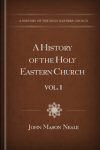
A History of the Holy Eastern Church, vol. 1
- Author: John Mason Neale
- Publisher: Joseph Masters
- Publication Date: 1850
- Pages: 570
The first volume of this set serves as a general introduction to the Eastern Orthodox Church. Neale covers the geographical and national origins of the various Orthodox churches, the ecclesiology of the Orthodox Church, its liturgies and worship, the Church calendar, and various points of contention with the Western Church as a whole and the Roman Catholic Church in particular.
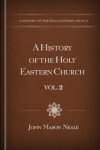
A History of the Holy Eastern Church, vol. 2
- Author: John Mason Neale
- Publisher: Joseph Masters
- Publication Date: 1847
- Pages: 348
The first of two volumes on the history and theology of the Patriarchate of Alexandria, covering everything from its apostolic foundations in the first century to the rise of the Nestorian controversy and the fourth Ecumenical Council of Chalcedon.
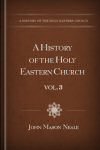
A History of the Holy Eastern Church, vol. 3
- Author: John Mason Neale
- Publisher: Joseph Masters
- Publication Date: 1847
- Pages: 494
Neale’s second volume on the history and theology of the Patriarchate of Alexandria, covering everything from the deposition of Dioscorus (fifth century), to the Synod of Jerusalem in the seventeenth century, which was assembled for the purposes of an Eastern Orthodox response to Calvinism.
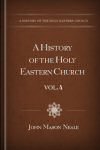
A History of the Holy Eastern Church, vol. 4
- Author: John Mason Neale
- Publisher: Rivingtons
- Publication Date: 1873
- Pages: 229
Starting with the apostles James and Peter, Neale gives a thorough overview of the history and theology of the Patriarchate of Antioch, all the way through the fourth century. The appendices also cover more recent (for Neale) interactions and discussions between the Patriarchate of Antioch and those of both Russia and Constantinople, along with its standing in the middle of the nineteenth century.
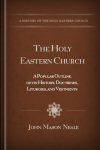
The Holy Eastern Church: A Popular Outline of its History, Doctrines, Liturgies, and Vestments
- Author: John Mason Neale
- Publisher: J. T. Hayes
- Publication Date: 1870
- Pages: 102
Along with a masterful introduction to the history and theology of the “Greek” or “Eastern” Churches, this volume both introduces and explains the theology behind the various vestments, liturgical celebrations, and miscellaneous services of the Eastern Orthodox Church, along with the manner and usage of service books in the Eastern tradition.
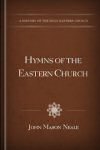
Hymns of the Eastern Church
- Author: John Mason Neale
- Publisher: J. T. Hayes
- Publication Date: 1870
- Pages: 250
This volume, a collection of multiple, original translations into English by Neale, includes ancient Eastern hymns such as “The Great Canon” of St. Andrew of Crete, “Canon for Easter Day” by St. John of Damascus, and “Canon for Christmas Day” by St. Cosmas the Melodist.
About John Mason Neale
John Mason Neale (1818–1866) was a translator, scholar, hymn-writer, and priest in the Church of England. Born in London to an Anglican minister, Neale became fond of the Oxford Movement later in life and, as a result, found opposition from both his diocesan bishop and his congregation. Forced to resign, he spent most of his life working on translations of ancient hymns and liturgies, especially of the Eastern Orthodox tradition, as well as co-founding the Society of Saint Margaret and the Anglican and Eastern Churches Association. He was responsible for translating and introducing a number of ancient and Eastern hymns and liturgies to the English-speaking world. He was also, notably, a contributor to the Christmas hymn “Good Christian Men, Rejoice,” as well as the Boxing Day carol of “Good King Wenceslas.” His most popular historical works include History of the Holy Eastern Church and History of the so-called Jansenist Church of Holland. He is commemorated by both the Anglican churches (August 7) and the Evangelical Lutheran Church in America (July 1).
Reviews
12 ratings

ekarudi
6/17/2021

Kevin Bratcher
6/12/2018
AeliusCicero
6/19/2014

David Roberts
3/23/2014

Kenny Rhodes
3/5/2014

G
1/2/2014
JONG HAN HWANG
11/25/2013
Curtis Dubreuil
10/15/2013

Doug
9/28/2013

Bill Shewmaker
9/10/2013